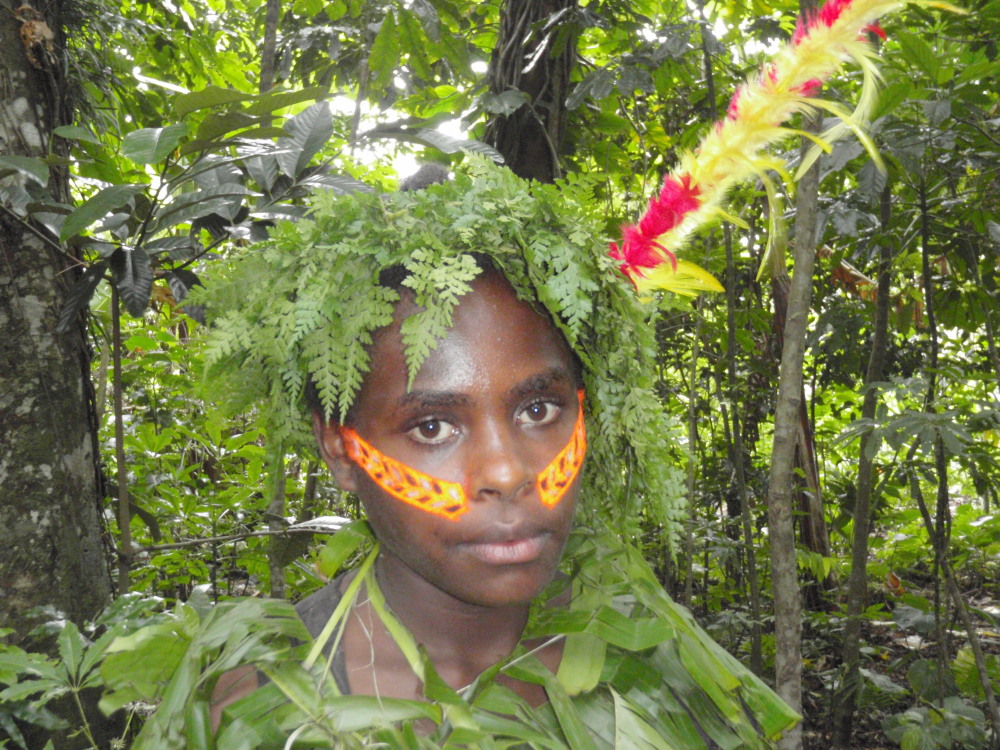Vanuatu – The untouched paradise
“Vanuatu – the untouched paradise” this is the claim the Ministry of Tourism chose for their advertising campaign, which is predominantly geared at Australians and Kiwis. But it is not just a claim, there is actually quite a bit of truth to it. Vanuatu is largely untouched, and this is predominantly because
a. Most people have never heard of it
b. It is very remote and quite difficult to get to
c. It was one of the last places on Earth where people practiced cannibalism
It gets only about 10% of the tourism trade of some of their neighbours with a similar mix in the offering such as Fiji or Tahiti, even though it is about the same distance from the main markets of Aussies and Kiwis. Vanuatu is a very unique place. Still to this day over 400 languages are spoken by the locals – called Ni-Vanuatu – in the 83 islands that comprise the country. It is the only place in the world where a colonial co-administration between British and French was attempted, with two governments, judicial systems, and of course languages. Despite the complications from this complex structure, the colony lasted until 1980, the year the group of islands formerly known as the New Hebrides actually gained independence and named itself Vanuatu. One main challenge has been communication between all the different people on the various islands with various languages and beliefs. One thing that makes life somewhat easier across the islands is that Bislama was introduced as the official language, a kind of pidgin English which is now spoken also in the Solomon Islands and all the way across to Papua New Guinea.
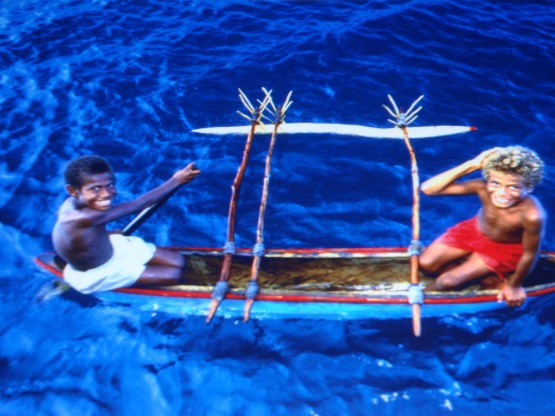
Vanuatu is also paradise, simply because it offers the perfect South Pacific dream. Warm waters and temperatures, lush vegetation, beautiful sunsets under palm trees, a sea breeze to keep you fresh, a coral reef as home to all those beautiful fish, friendly locals, tasty fresh food, ancient cultures, and smiles everywhere. But it has one other major ingredient that most other “paradises” lack. Vanuatu is one of the last corners of this planet that has been “largely untouched” by the white man, or modern civilization. They have had their share of visitors of course in the past centuries, including the merciless Spaniards, and James Cook, followed by ruthless traders who raped the land of sandalwood and took slaves to plantations on other South Pacific islands, and its fair share of various missionaries. However, a substantial number of these encounters ended in bloody warfare, often with the result of the visitors being prepared as a tasty dinner. And, more importantly, the KASTOM traditional rituals and ways of living still exist, mostly as a revival after years of colonial and missionary efforts that most often banned any KASTOM tradition. Especially in the smaller remote islands such as the Banks and Torres group to the North, life has not really changed in the last 1000 years or so.
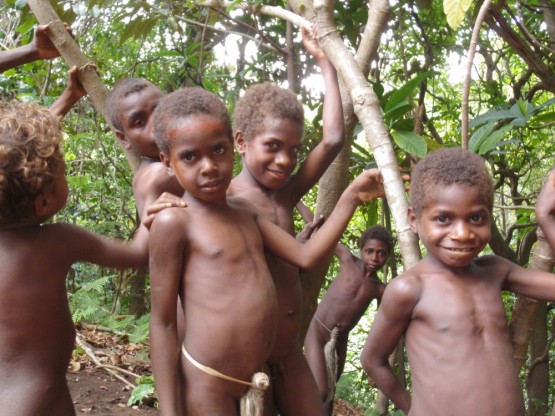
But, you need to hurry, since globalization is a big beast whose tentacles reach to the farthest corners of our planet. In Vanuatu the biggest novelty is the mobile phone, largely pushed by DIGICEL on World Bank grants. They have the most incredible sales network I have witnessed. We drove through the remotest jungle, and sure enough there is a little shack out of nowhere with a little red sign on it, proudly offering prepaid top up credit for your mobile (we had seen this in Fiji already). They use old Nokias and are so excited about texting and speaking to their relatives on other islands. Is this only the beginning of the modern world?
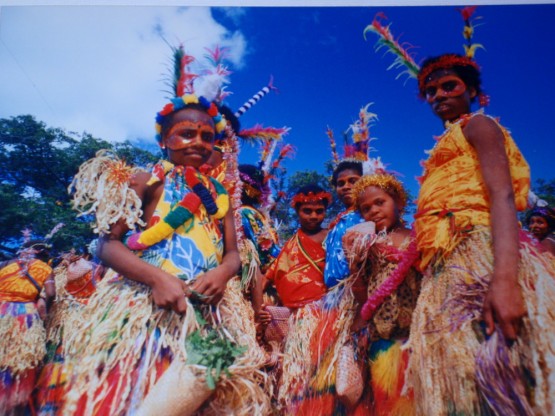
We actually picked Vanuatu as one exotic location on our travel because it was just about as far away as we could get from home and because neither of us had any preconceived ideas about what we would expect there, in fact we had not really heard of it. Once the routing was set we stumbled upon a relatively recent study that showed that Ni-Vanuatu are the happiest people on the planet.
The New Economics Foundation NEF published the results of a comprehensive 2006 study on happiness entitled the Happy Planet Index. It considered a range of variables and was looking at the level of contentment, environmental footprint to ensure sustainability, health, economic development, etc. (see http://www.happyplanetindex.org/ ). Well, Vanuatu topped the list of over 150 countries. The happiest place on this planet! We were eager to find out why…
We have found many people here who are very satisfied with their lives, who do not need anything else to make them happy. I cannot recall any place on Earth that has given me so many sincere broad smiles. How can this be, with them not working very much and not owning very much? The Ni-Vanuatu are in that blissful phase between slaughtering each other (which every part of the world went through for centuries at different points in time) and not having been reached by modern industrial technology-driven capitalist society. The key reason for satisfaction among the people here is clearly that they live in relative peace and that they have everything they need to lead a pleasant free life. In fact, some islands still to this day do not use official money, since they would not know what to do with it (they trade and use shell money or pigs instead). Life in the village is completely self-sustained, it is not hard. The mountainous geography and climate provides ample fresh water and natural gardens that supply more than needed of everything. Wood everywhere for the fire and coconut oil for the lamps makes cooking easy. The houses are built of sticks and palm leafs and can sustain quite a bit of weather. After a heavy cyclone you quickly build a new one. The village chief decides what needs to be done. The kava root supplies the local drug to get stoned without waking up with a headache the next morning. There is not much work to do and plenty of time to play in the ocean. WOW, what a life!
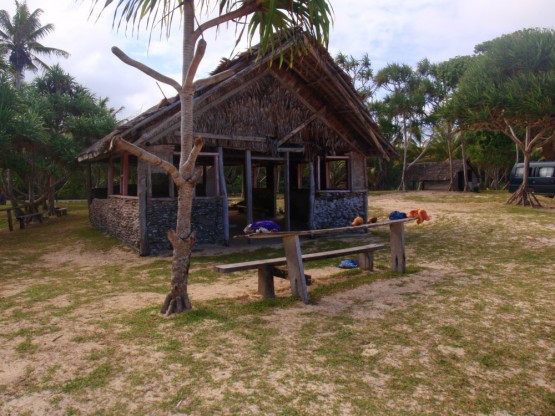
Beachfront property
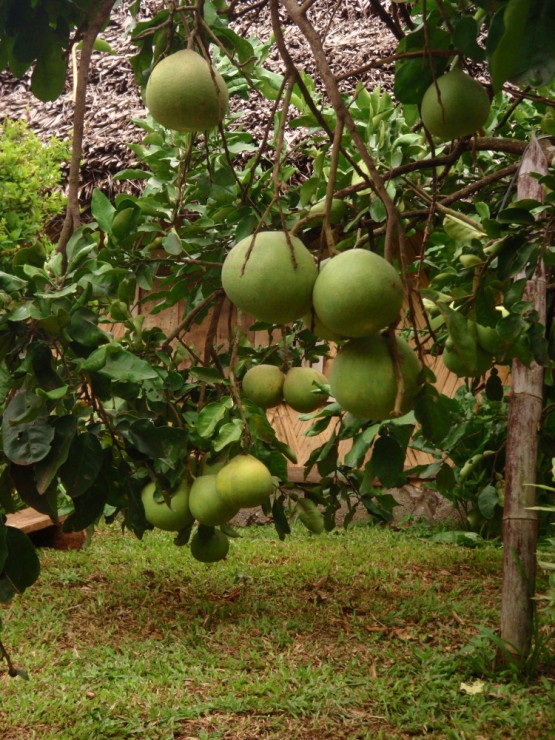
More Pampelmouse than an entire village can eat
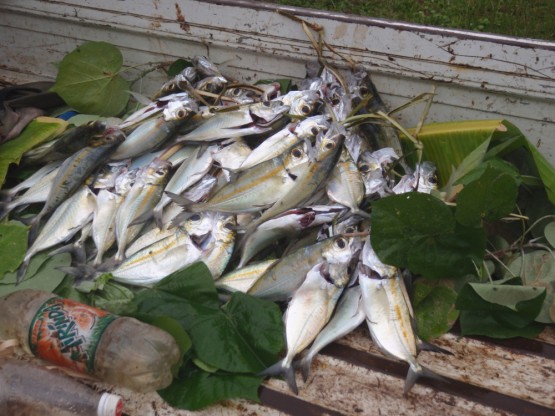
you want fish? just grab a spear and step in the ocean…
Then there is the lost ART OF THE IDLE MOMENT (this also happens to be the title of one of my favourite albums by Carmen Rizzi). The Ni-Vanuatu are great masters of this, sitting around for hours under a tree or on a beach doing nothing, just enjoying the moment. Not once did I see a person in such an idle moment who seemed to be bored or antsy.
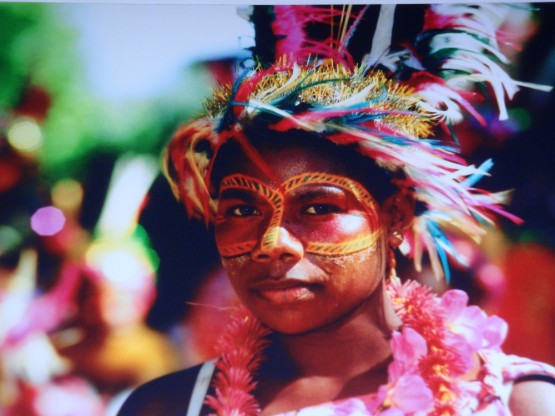
Of course, not all is good in such a self-sustained world, there is no perfect world as we know. The Ni-Vanuatu have their share of conflicts within and between families, land disputes etc. But clearly a roof over your head, access to clean water and more tasty food than you need goes a long way to create satisfaction. Plus there is a bit of dancing and bungee jumping to entertain the soul:
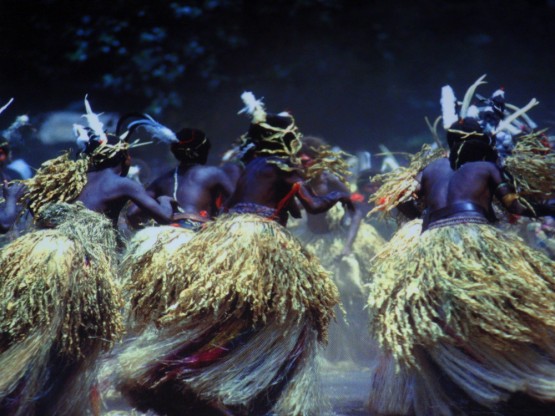
drumbeats and stomping
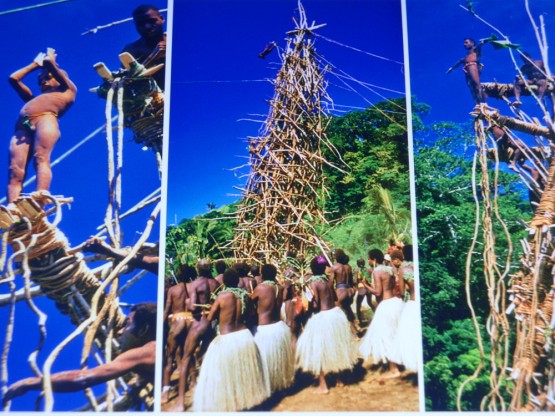
to this day on the island of Pentecoast, young boys and men jump of towers with roots at their ankles to impress the pretty girls
Needless to say, it is a seemingly insurmountable challenge for us to live like this. We just cannot sit still, we are a restless tribe. We are driven by time, projects, growth, adventure. We would miss inspiration and all those amenities that we have become used to in the Western world. But is it just the fact that the Ni-Vanuatu have not been exposed to “Western” lives, or is there something deeper, some simple secret to maintain a blissful balance in their own free and stress-free world? What will happen if all those little towns get their first little Walmarts over the next ten years? Can we and should we warn them about all the devils of Western capitalism? Back in Port Vila, I got a really good insight into this from Norman Torres, a Peace Corp worker from Puerto Rico, who teaches on the very remote island of Mota in the North, once the stronghold of the Anglican missionary drive under Bishop Patteson aboard the Southern Cross. He has seen a lot of 3rd world and developed world misery and issues and here is his take on the issue: We, the people from “Western civilization” are the ones who can and should make decisions to consume and own less, live a greener life with renewable energy sources, avoid and clean up garbage etc. We are in the luxurious position to consciously give up the television or SUV, since we have had it, experienced it and decided for ourselves that we do not need them and/or that they harm the planet. We should live by example, that is the best way to communicate lessons about what we believe is important to others. Regarding the people of Tanna in Vanuatu, we cannot treat them like children and tell them they cannot have a taste, after all we have had a lot of taste. They have seen or will soon see our lives and “things” in American movies and they will want them as well, more and more. I am worried, and would love to find a way to support maintaining all those authentic smiles…
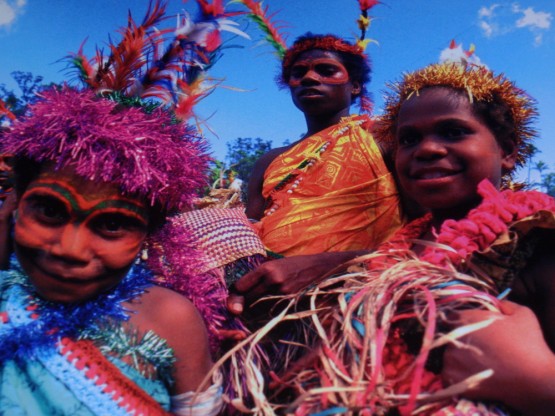
There seem to be two main ways to make it happen:
1. Live by example, i.e. be happy with less and green lifestyle, devoid of greed and hunger for power
2. Develop goods such as cars and electronics that are better for the soul and the environment, and make these more attractive for everyone
One thing that amazed us is how hard it is for Ni-Vanuatu to grasp the concept of money. Because they have everything they need they act very spontaneously with money. A few examples: Employees often come for a while until they have earned enough money to pay for their relative’s plane ticket, then they just do not show up any longer, they see no need. Rather than filling their tank and then driving, minibuses will head to the gas station several times a day and get fuel for 5 or 10 $, often simply because they are just using the fare they just received from guests to pay for the fuel. Basically, Ni-Vanuatu will spend instantly what they get, the concept of saving has not entered their space yet. Solar is another great example. Their little huts are just screaming for self-sustained natural power, but even an investment of a 5 month power bill is beyond their savings horizon. This is even more surprising considering that Vanuatu is a great place to bring your money from abroad, as it is largely tax free. It has 55 banks, of which only 3 have an actual counter. The story of Tanna coffee is a great manifestation of why people in Tanna are happy. There is excellent coffee on Tanna, we had some and even brought some back to Australia. The climate and topography makes for near perfect growing conditions. The traders could take all the coffee they could get their hands on and sell it for a premium. But only a small amount of coffee is picked and roasted, twice a year to be precise, when the school fees for a term of approx. 20$ are due. Locals go and pick coffee to pay for the school fees and then they just do not pick any more. The point is: there is no need for them to pick more because they do not need any money because they have everything they need to live and do not long for anything beyond that.
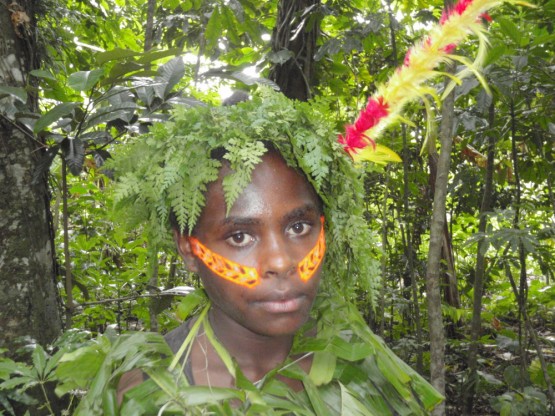
very pure…
Vanuatu has a large bag of traditions, religious beliefs and cults, and most people use some combination of whatever works for them. There is the mother of all bungee jumps on the island of Pentecoast which is still practiced to this day by young men trying to impress and show their manhood the girls. There is water music on the island of Gaua, where skilled women hit the water in choreographed efforts, creating wild natural sounds. There is the snake dance and the dances of Kastom villages. There is black magic! And yes, it was common practice to prepare the enemy for dinner after a fierce battle, mainly to take on his “mana”, or life energy. Sometimes, when surrounded by 5-10 young men carrying machetes and coconuts, I could not help myself but think that maybe the practice has not died yet and that in the far corner of their brains they were dreaming of marinating some white flesh in coconut oil and roasting it later. The last documented case of cannibalism took place in 1967, but certainly there have been some dark corners of these islands where Kastom took a bit longer to change.
Life here is so different, pleasant, strange, exotic, happy…
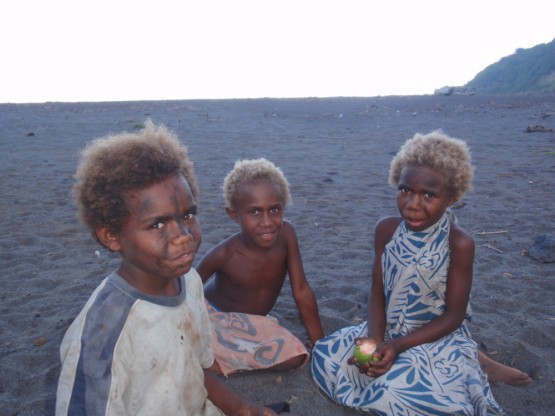
relaxing on the beach at Sulphur Bay… far away from any sign of the “Western” world
Categories: Vanuatu
